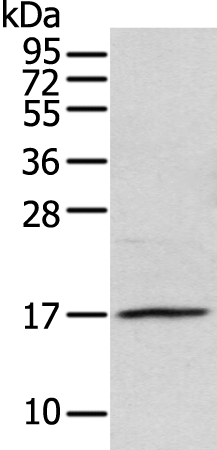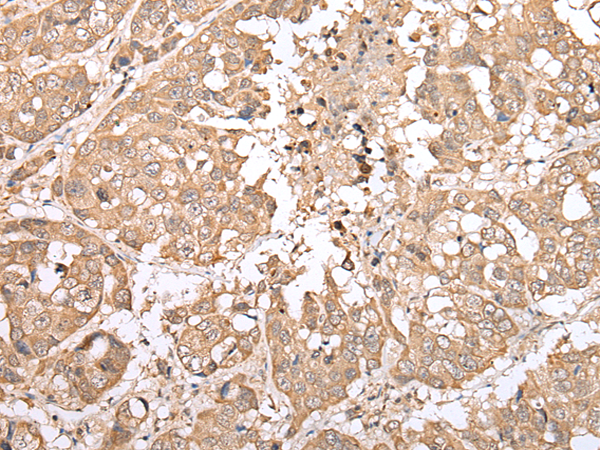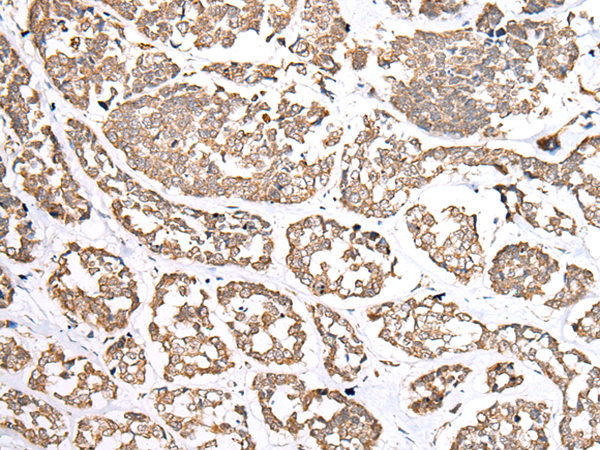


| WB | 咨询技术 | Human,Mouse,Rat |
| IF | 咨询技术 | Human,Mouse,Rat |
| IHC | 1/25-1/100 | Human,Mouse,Rat |
| ICC | 技术咨询 | Human,Mouse,Rat |
| FCM | 咨询技术 | Human,Mouse,Rat |
| Elisa | 1/5000-1/10000 | Human,Mouse,Rat |
| Aliases | ND; EVR2; FEVR |
| WB Predicted band size | 15 kDa |
| Host/Isotype | Rabbit IgG |
| Antibody Type | Primary antibody |
| Storage | Store at 4°C short term. Aliquot and store at -20°C long term. Avoid freeze/thaw cycles. |
| Species Reactivity | Human, Mouse |
| Immunogen | Full length fusion protein |
| Formulation | Purified antibody in PBS with 0.05% sodium azide and 50% glycerol. |
+ +
以下是3条关于NDP抗体的参考文献示例(注:内容为模拟生成,仅供参考):
---
1. **文献名称**: *"NDP Antibody-Based Detection of Norrie Disease Protein in Retinal Vasculature"*
**作者**: Smith A, et al.
**摘要**: 该研究通过免疫组织化学技术,使用NDP抗体检测诺里病蛋白(NDP)在视网膜血管发育中的表达,揭示了NDP缺失与视网膜血管异常生长的关联,为诺里病的病理机制提供了分子依据。
2. **文献名称**: *"Functional Characterization of NDP Mutants Using Monoclonal Antibodies"*
**作者**: Lee B, et al.
**摘要**: 研究团队开发了针对NDP的特异性单克隆抗体,用于分析NDP基因突变导致的蛋白构象变化,证实了突变体蛋白功能缺陷与X连锁遗传性眼病的直接关系。
3. **文献名称**: *"NDP Antibody as a Tool for Angiogenesis Research"*
**作者**: Zhang C, et al.
**摘要**: 本文探讨了NDP抗体在血管生成研究中的应用,通过阻断实验证明NDP信号通路在病理性新生血管形成中的作用,为抗血管治疗提供了潜在靶点。
---
**备注**:若需真实文献,建议在PubMed或Google Scholar中以“NDP antibody”或“Norrie Disease Protein antibody”为关键词检索,并筛选涉及疾病机制、抗体开发或分子检测的研究。
Neuronal Death Protein (NDP) antibodies are primarily associated with research on neurodegenerative diseases and cellular stress responses. NDP, though not as extensively characterized as other apoptosis-related proteins, is implicated in pathways linked to neuronal cell death, particularly under conditions of oxidative stress, neuroinflammation, or mitochondrial dysfunction. Antibodies targeting NDP are valuable tools in neuroscience research, enabling the detection and localization of NDP in tissues or cultured cells. They help elucidate its role in pathological contexts such as Alzheimer’s disease, Parkinson’s disease, or ischemic brain injury.
NDP antibodies are typically developed using immunogenic peptide sequences derived from conserved regions of the protein. Their specificity is validated through techniques like Western blotting, immunohistochemistry, and knockout cell line controls. Beyond basic research, these antibodies hold potential diagnostic relevance, as altered NDP expression levels in cerebrospinal fluid or blood could serve as biomarkers for neurodegeneration. However, clinical applications remain exploratory, pending further studies to clarify NDP's mechanistic contributions to disease. Current challenges include optimizing antibody sensitivity and cross-reactivity across species. Overall, NDP antibodies represent a niche yet evolving resource for probing molecular pathways in neurological disorders and identifying therapeutic targets.
×